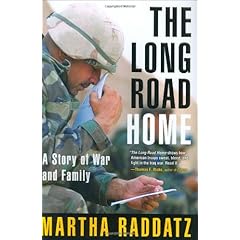Not about Casey Sheehan per se, but does cover his heroics which cost him his life. Sounds like an interesting book. Info from Amazon.com
From Publishers Weekly
Violent resistance in post-invasion Iraq kicked into high gear on April 4, 2004, when American troops in Sadr City faced a massive assault that claimed eight soldiers' lives and wounded more than 70 others. Raddatz, an Emmy-winning correspondent for ABC News, clearly aims to equal the storytelling in Mark Bowden's Black Hawk Down in her account of the battle, and hits the mark with distinction. Extensive interviews with the commanding officers of the army's 1st Cavalry division and the soldiers pinned down in the streets provide a clear narrative of how U.S. troops, prepared for "a babysitting mission," found themselves in a bloodbath, as efforts to rescue the first soldiers fired upon met with even greater resistance from Mahdi militiamen who did not hesitate to use small children as frontline attackers. Heroic moments abound, like Casey Sheehan's volunteering to take another man's place on the rescue team, which resulted in his death. Raddatz touches upon the reaction of his mother, noted antiwar activist Cindy Sheehan, but this is just one of many perspectives from families on the home front. The gripping account eschews politics and focuses squarely on the soldiers and their sacrifices. (Mar. 1)
Copyright � Reed Business Information, a division of Reed Elsevier Inc. All rights reserved.
From Booklist
Raddatz, the chief White House correspondent for ABC News, has also spent considerable time not on the White House lawn or in the pressroom but covering, in person, the war in Iraq. To personalize war is usually the province of fiction and cinema, with nonfiction often left to be the more analytical side of war coverage. But here Raddatz infuses, with a professional elan belying the fact that this is her first book, her observations with the immediacy and even the discomfort that a novel would be expected to bring home to the reader (the discomfort being an unavoidable but perhaps necessary byproduct of any realistic depiction of war). Home is a particularly appropriate word here, because the home front is the flip side of her account. She's right there describing in horrific detail all the blood and guts, fear and anguish and bravery, of what the men and women she talked to and learned from endured on the front line. But she alternates these graphic scenes with poignant ones from back home, where mothers and wives await their loved-ones' deployment or dread the fateful knock on the door with bad news. To read her succinct, trenchant prose is to experience what we may not want to experience--but need to. There is considerable publisher push behind this book, so expect demand. Brad Hooper
Copyright � American Library Association. All rights reserved
